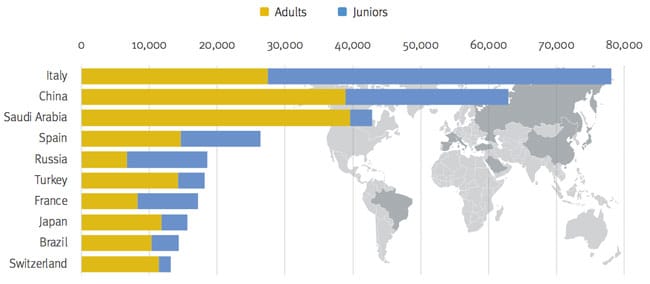UK’s first Green List for summer travel leaves out key student markets
- Beginning 17 May, travellers from a small number of countries will be able to travel to the UK without needing to self-isolate or quarantine
- None of the main sending markets for UK ELT providers are included on the list
- English UK is calling on the government to step up supports for providers
With summer around the corner, governments everywhere are balancing the urgency of reviving their tourism and trade sectors with preventing yet another COVID infection wave. Several countries are making public their lists of countries from which people – including students – can enter their borders without needing to quarantine. Naturally, these lists carry massive implications for providers of summer language programmes and other short courses.
The UK has now released its own system for the summer, organised according to a traffic light metaphor. Beginning 17 May, only people from countries on the “Green List” will be allowed to enter the UK without needing to self-isolate or quarantine. The Green List will be reviewed every three weeks from 17 May and changes will be made as deemed necessary.
The inaugural Green List is as follows:
- Portugal
- Israel
- Singapore
- Australia
- New Zealand
- Brunei
- Iceland
- Gibraltar
- Falkland Islands
- Faroe Islands
- South Georgia and the South Sandwich Islands
- St Helena, Tristan de Cunha, Ascension Island
The top source markets for UK ELT, for Q3 2019, are reflected in the graphic below. None appear on the initial version of the Green List.

English UK warns of deepening crisis
Responding to the government’s publication of the list, English UK said:
“The brevity of the green list and the absence of many key source markets including much of Europe, along with the cost of testing and ongoing quarantine measures, present devastating barriers to doing business for the UK ELT sector.”
Even before the list’s announcement, one-third of English UK members had expected zero recovery in 2021 and two-thirds expected less than a 40% return to pre-pandemic revenues and business.
English UK is calling for “targeted business support for UK ELT and other industries that rely on inbound tourism,” nothing that “this is needed now more than ever.”
James Herbertson, Chair of English UK London, says concisely in the video below: “We are asking one simple thing: extend business rates relief to all language schools up and down the country.” This kind of relief would be targeted to schools that own their buildings. The video also makes it clear how many other businesses and people are affected by the COVID-related crisis in the industry.
What will the summer look like?
The first Green List will be updated sometime in June, at which point – if vaccination rates, as well as infection rates, improve in source markets – more countries could be added. But a sticking point is that younger students will likely not be fully vaccinated by that time. EL Gazette writes:
“If vaccine passports are the key to unlocking language travel … it’s good news for the adult market, but bad news for the under-16s, as vaccines are not yet licensed for use with this age group.”
Several major student and agent surveys are showing that demand for study in the UK is quickly rising due in large part to the fast vaccination rollout in the country and correspondingly better COVID infection rates. EL Gazette spoke with a major summer ELT provider that pointed out that even so, remaining travel restrictions could mean that UK ELT providers will have to wait till August for partial recovery:
“A big summer provider said that, though demand was high, because the UK was seen as safe, the likelihood of students being allowed in by the beginning of July was about 50/50, depending on the COVID rates in the country they were coming from. It’s looking better for August, when infection rates are predicted to drop.”
Providers, meanwhile, are making plans to move ahead with online offerings, or in some cases are offering ELT programmes in markets outside of the UK. Creative as many schools have been, the reality is that much of the allure of studying English in the UK is cultural immersion – the ability to learn with peers in a leading English-speaking destination. Many schools are offering clear communications about generous cancellation policies and safety procedures, but the sector remains in need of additional government support.
Demand will be there post-COVID
When the pandemic ends – at least to the point where societies and borders open and life returns to somewhat normal – many predict that there will be a huge resurgence of international travel. “Revenge travel” is now a buzzword. Mike Kennedy, co-founder of the travel marketplace KOALA explains the idea like so:
"After being confined for a year, ‘revenge travel’ is essentially a slingshot back into the world. It’s a visceral response to pent-up travel demand.”
Konrad Waliszewski, co-founder and CEO of the travel app Tripscout goes further into the psychology behind revenge travel:
“We are no longer going to take for granted that there will always be a flight tomorrow and an open border waiting to greet us. We will make up for the lost time and experiences with a vengeance.”
Recent research suggests that the concept is real. For example, 82% of American families have already made travel plans for 2021, and:
- 65% of respondents plan on traveling more than they did pre-COVID;
- 33% are willing to spend more on travel than they traditionally would;
- 54% say they are more likely to take their bucket-list trip this year than ever before.
All of those observations point to a strong rebound in demand for study travel. The question, as it has been for some time now, is when and how quickly that recovery will take shape.
For additional background, please see:
















